Soccer newsletter: Who is winning MLS’ version of moneyball this season?
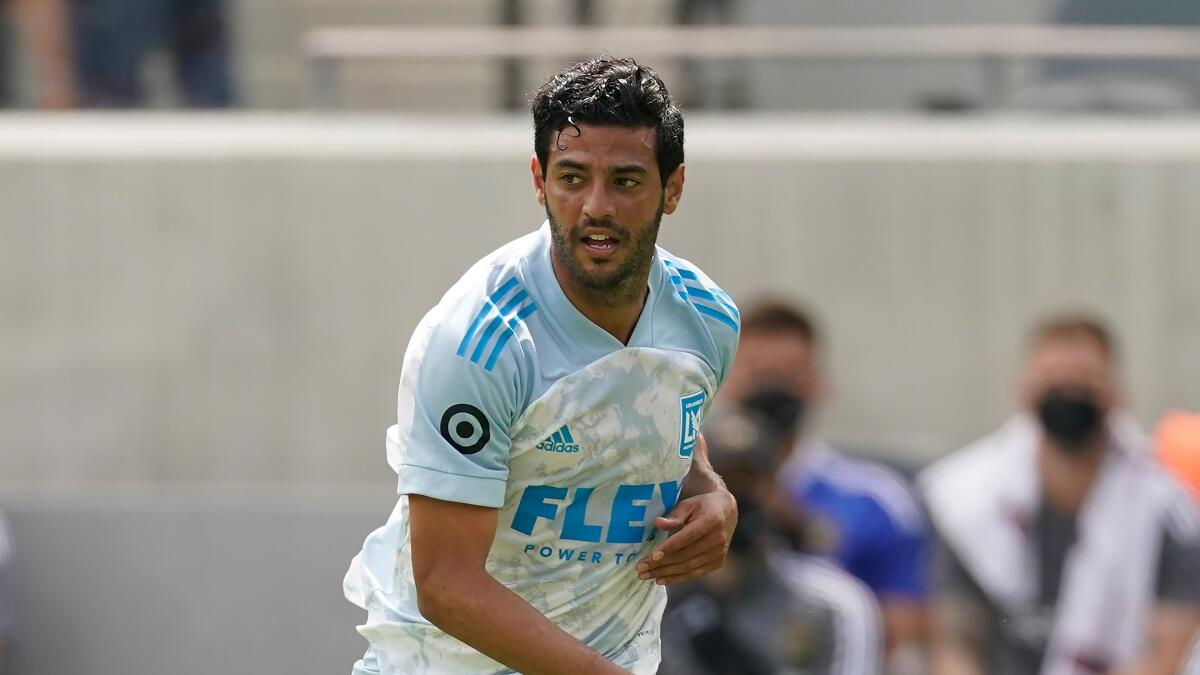
Hello and welcome to the L.A. Times soccer newsletter. I’m Kevin Baxter, the Times’ soccer writer and we start the MLS Money Edition of the newsletter with a question: how much is a win worth?
In a league with a payroll cap and salary rules that are harder to follow than calculus, it’s impossible for a team to spend its way to success. Instead, it’s all about the ability to do more with less. And with the MLS Players Association releasing its second batch of salary figures last week, now we can measure which teams are spending wisest.
It should come as no surprise that former Galaxy coach Bruce Arena, now with New England, is with the team at the top of that list. The Revolution, which clinched its first Supporters’ Shield title during the weekend, needs three points from its final two games to break the MLS single-season points record.
Most remarkable, however, is the fact that Arena has done that while spending less than 19 other teams. New England (21-4-7) has spent about $167,000 per point this season — lowest in MLS — in getting the most out of a payroll of less than $12 million. Compare that with the Galaxy (13-11-7), whose payroll grew $3.4 million since May to a league-high $20.3 million. Or LAFC (11-12-8), which is fighting to get into the playoffs despite have the league’s highest-paid player in Carlos Vela and the fifth-highest payroll in MLS at nearly $15.9 million.
Both Southern California teams are spending more than twice as much per point than New England, which regularly starts nine players earning less than the average league salary of $418,000.
When Arena was winning MLS Cups with the Galaxy, his big-budget teams were littered with high-paid stars such as Landon Donovan, David Beckham, Robbie Keane, Steven Gerrard and Omar Gonzalez. With New England, Arena has been forced into more of a “Moneyball” approach while trying to find value where others don’t and making the most of every signing.
Richie Williams, who played for Arena in college at Virginia and is now his top assistant with the Revolution, said the coach has proven as adept at that as he was at spending his way to titles. One example Williams cited is Tommy McNamara, a 30-year-old journeyman midfielder New England acquired last summer in a trade with the Houston Dynamo.
“Initially it was bringing him in to be a guy that we know was a smarter player, not physically gifted, understood the game,” Williams said. “He was going to be a guy that we could start every once in a while, but probably be a reserve. But through the environment that we’ve created in training, Tommy’s really excelled and now he’s in the starting lineup.
“Bruce understands that how to bring a player like that into the team.”
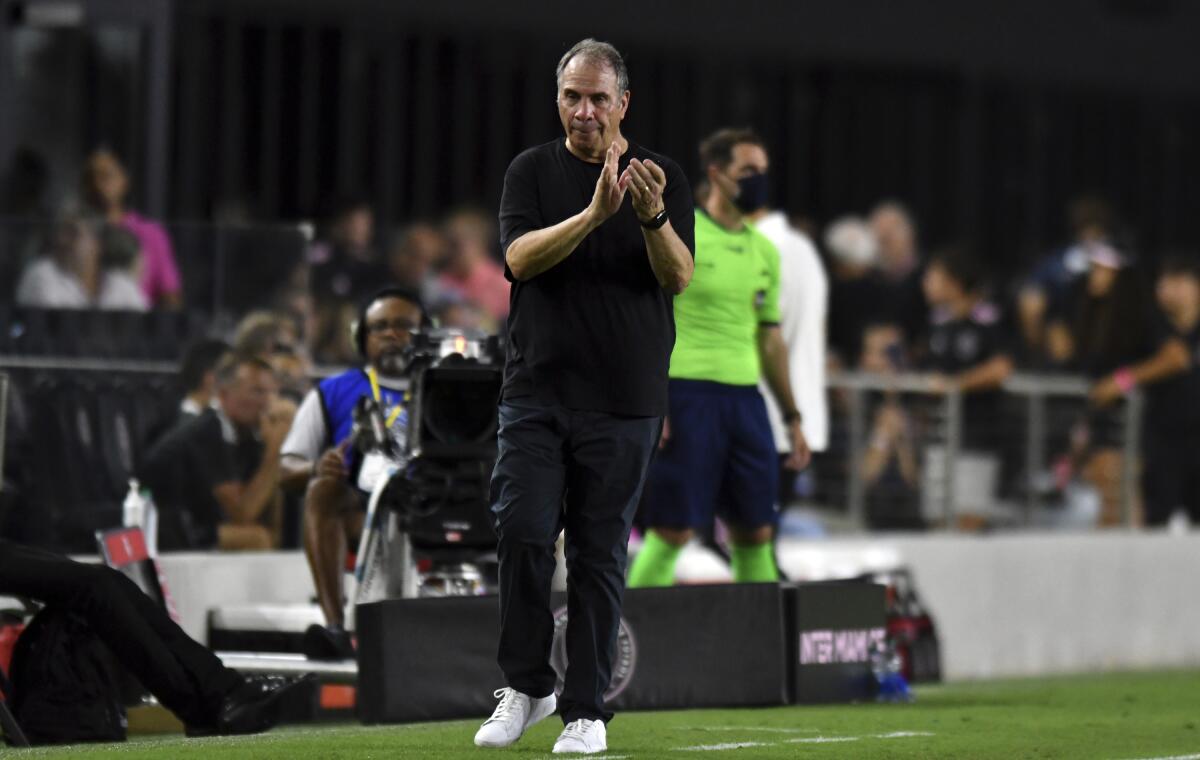
Arena had similar success with the Galaxy where, despite the large payrolls, he also relied on role players like Alan Gordon, Baggio Husidic and Leonardo.
“He lets his players play freely. He doesn’t give you many restrictions,” said defender A.J. de la Garza, who won three MLS Cups with Arena in Carson and now plays for him in New England. “And that, for a player, is what you want. To be kind of making your own decisions on the field.
“He’s probably the best GM this league has ever seen as well. So he’s not just the head coach. He’s getting the guys that that he wants and he trusts. And I think we all play for him.”
Two of the three teams at the top of the Western Conference standings also are good at getting the most out of their spending. Colorado (15-6-10) is third in the table and already has clinched a playoff berth despite the fact team owner Stan Kroenke, who also owns the Rams and England’s Arsenal, spent an MLS-low $9.9 million on salaries.
Kroenke is paying three Arsenal players more than the entire Rapids roster, with Arsenal in the middle of the Premier League standings after nine games. In Colorado, coach Robin Fraser is winning despite the penny-pinching, with each point costing less than $180,000 — only New England is most cost-effective.
Enjoying this newsletter? Consider subscribing to the Los Angeles Times
Your support helps us deliver the news that matters most. Become a subscriber.
Meanwhile Seattle (17-7-7) has clinched its 13th consecutive playoff berth — only the Pittsburgh Penguins, with 15 postseason appearances in a row, has a longer active postseason streak among U.S. and Canadian teams in the seven majors sports leagues — while spending less than $235,000 per point. Just four teams are thriftier.
Toronto has the league’s third-highest payroll but just six wins to show for it, spending nearly three-quarters of a million dollars per point.
The Galaxy and Javier “Chicharito” Hernández, whose $6 million in guaranteed compensation trails only Vela’s $6.3 million, are spending almost $442,000 per point, sixth-most among the league’s 27 teams and slightly more than LAFC at $388,000.
The Galaxy’s summer spending spree under coach Greg Vanney, which included the additions of Sega Coulibaly ($337,000), Rayan Raveloson ($855,025) and Dejan Joveljić ($612,500) plus half-million-dollar raises for Efraín Álvarez ($612,167) and Julian Araujo ($653,750), resulted in the team climbing to the top of the league in total payroll. Atlanta is the only other team spending more than $20 million on salaries this season.
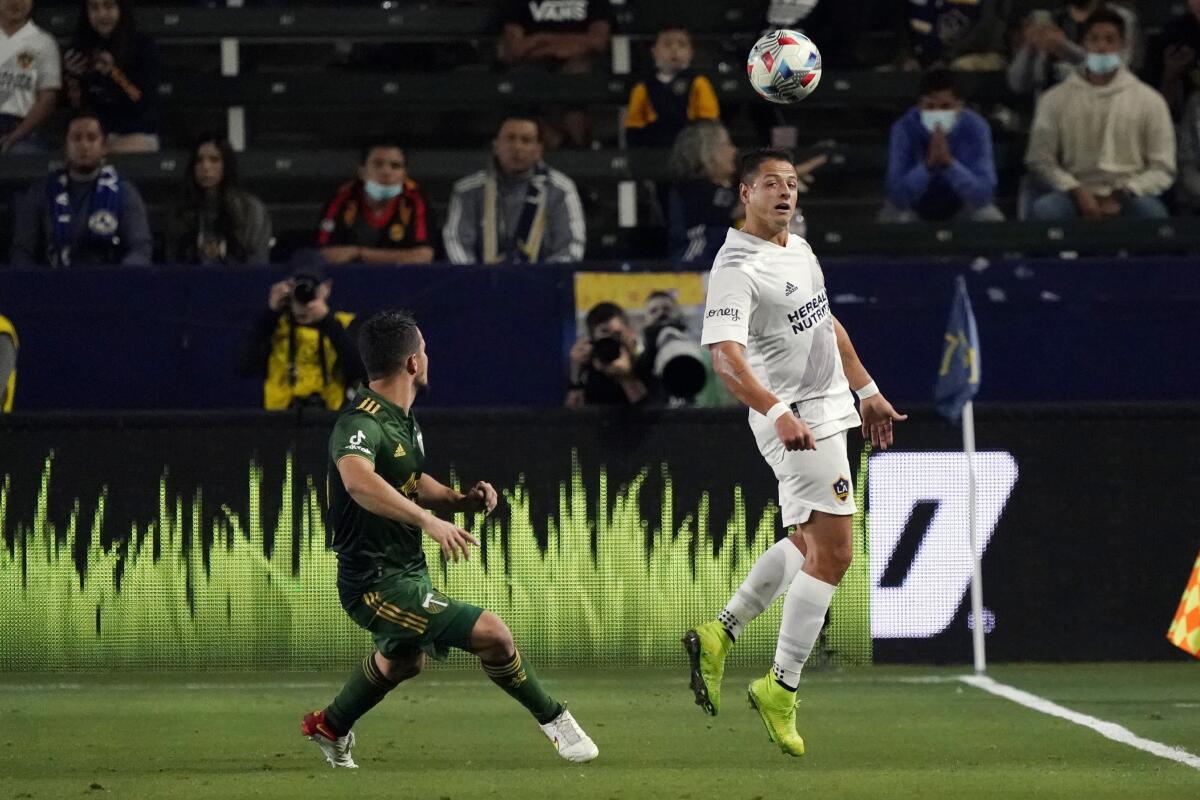
Vanney’s teams in Toronto led the MLS in spending in all seven seasons he was coach.
With Joveljić, Hernández, Kévin Cabral ($1.44 million) and Samuel Grandsir ($938,427), the Galaxy are spending nearly half their payroll on forwards. They also lead the league in spending on defenders at $4.808 million.
LAFC’s spending ranks in the top half of the league only at forward, where Vela’s salary accounts for nearly three-quarters of the $8.9 million bill. Only the Galaxy spent more at that position.
MLS payrolls by team
- Galaxy, $20,322,677
- Atlanta, $20,058,025
- Toronto, $19,272,292
- Miami, $17,546,831
- LAFC, $15,875,124
- New York City, $15,163,891
- Columbus, $14,319,351
- Kansas City, $14,219,111
- Seattle, $13,558,370
- Cincinnati, $13,122,516
- Chicago, $13,035,568
- Nashville, $12,766,244
- Montreal, $12,725,037
- Salt Lake, $12,659,495
- Austin, $12,576,476
- Dallas, $11,986,192
- Portland, $11,980,061
- Minnesota, $11,796,418
- Orlando, $11,681,764
- New England, $11,681,240
- DC United, $11,506,162
- Houston, $11,152,451
- San Jose, $11,036,928
- Vancouver, $10,962,821
- Philadelphia, $10,484,622
- New York Red Bulls, $9,976,295
- Colorado, $9,890,085
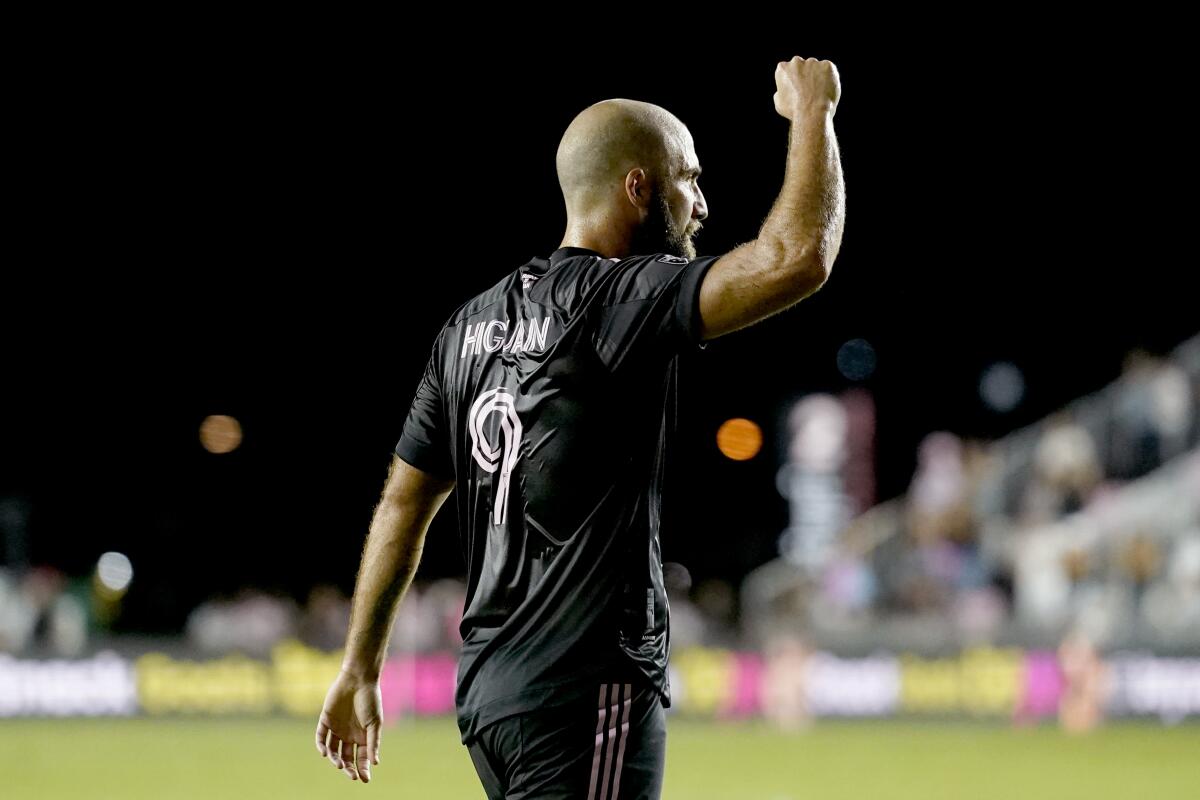
Top 10 MLS guaranteed compensation
- Carlos Vela, LAFC, $6.3 million
- Javier “Chicharito” Hernández, Galaxy, $6 million
- Gonzalo Higuain, Inter Miami, $5.79 million
- Alejandro Pozuelo, Toronto, $4.69 million
- Luiz Araujo, Atlanta, $3.94 million
- Josef Martinez, Atlanta, $3.89 million
- Josy Altidore, Toronto, $3.6 million
- Rodolfo Pizarro, Inter Miami, $3.35 million
- Maxi Morales, New York City, $3.29 million
- Victor Wanyama, Montreal, $3.09 million
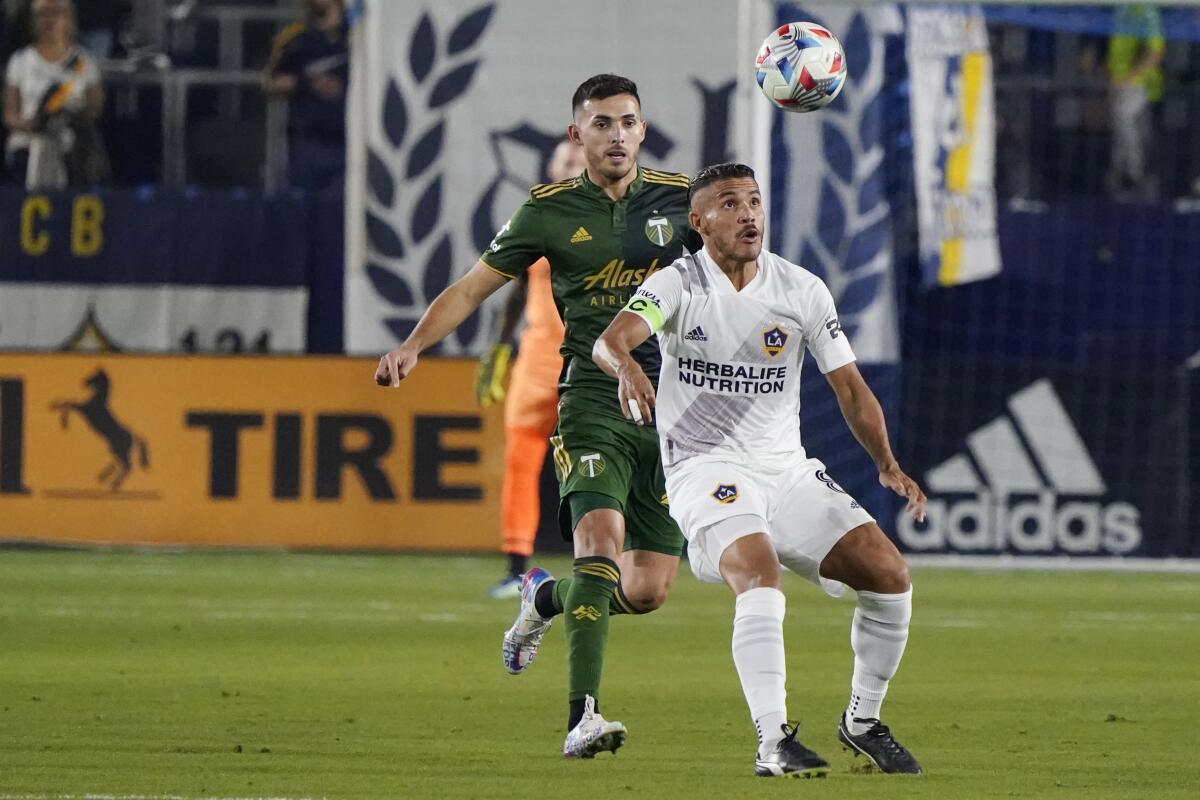
Galaxy guaranteed compensation
D Danilo Acosta, $135,000
M-F Daniel Aguirre, $63,547
M Efraín Álvarez, $612,167
M Julian Araujo, $653,750
GK Jonathan Bond, $501,875
F Kévin Cabral, $1.44 million
D Sega Coulibaly, $337,000
D Nick DePuy, $81,375
M Jonathan dos Santos, $2 million
M Cameron Dunbar, $116,750
M Adam Saldana, $87,309
D Marcus Ferkanus, $103,625
D Oniel Fisher, $147,625
D Giancarlo González, $850,000
F-M Samuel Grandsir, $938,427
D Nicolas Hämäläinen, $612,500
M Carlos Harvey, $81,375
F Javier Hernández, $6 million
F Dejan Joveljić, $612,500
GK Jonathan Klinsmann, $81,375
M Sacha Kljestan, $247,350
M Kai Koreniuk, $85,444
M Sebastian Lletget, $923,750
GK Eric Lopez, $81,375
D Jalen Neal, $103,625
M Jonathan Pérez, $146,750
M Rayan Ravelson, $855,025
D Daniel Steres, $393,750
M Victor Vázquez, $439,167
D Jorge Villafaña, $486,667
GK Justin Vom Steeg, $85,444
D Derrick Williams, $821,458
F Augustine Williams, $63,547
F Ethan Zubak, $133,125
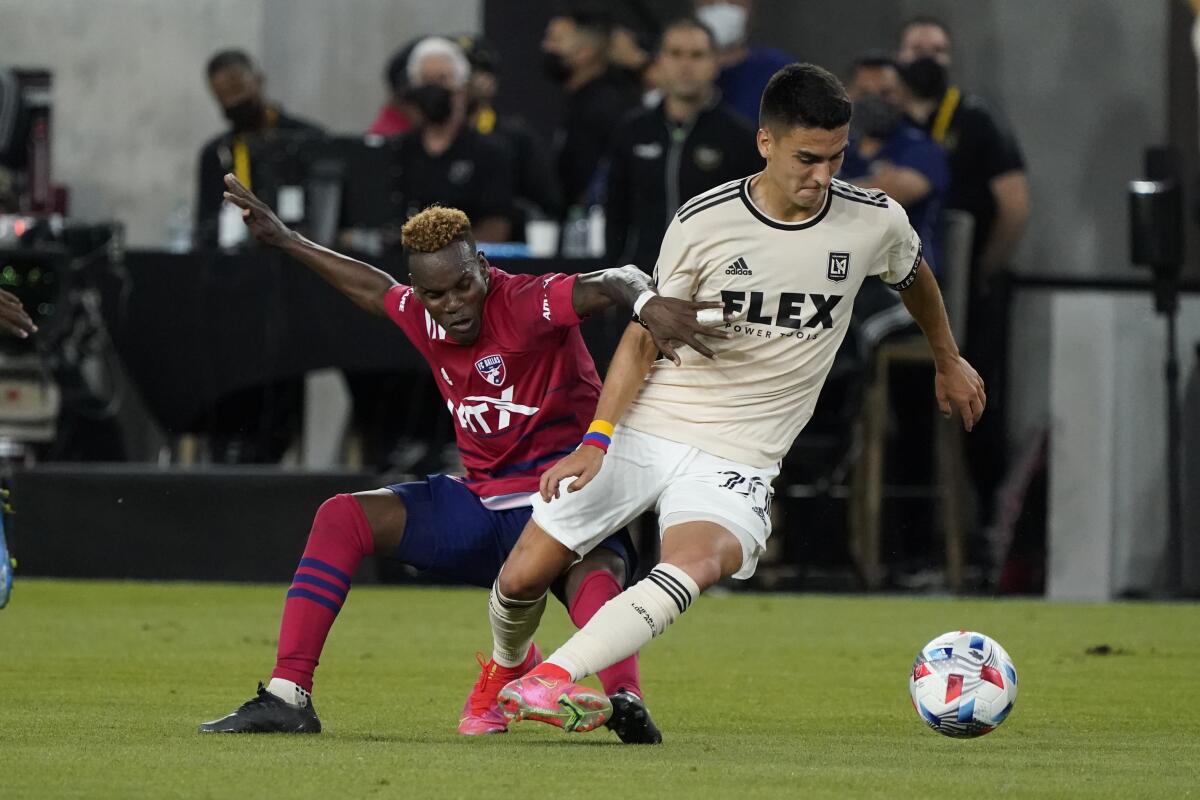
LAFC guaranteed compensation list
F Cristian Arango, $659,000
D Eduard Atuesta, $1.278 million
GK Jamal Blackman, $409,333
D Tristan Blackmon, $203,000
M Latif Blessing, $376,667
M José Cifuentes, $411,750
M Daniel Criostomo, $63,547
D Erik Duenas, $90,000
M Raheem Edwards, $96,375
D Mamadou Fall, $94,125
D Marco Farfan, $190,000
D Julian Gaines, $83,375
M Francisco Ginella, $547,250
D Jordan Harvey, $110,000
D Sebastian Ibeagha, $177,125
F Cal Jennings, $81,375
D Antonio Leone, $83,375
D Kim Moon-Hwan D $524,000
D Jesús Murillo, $459,500
F Danny Musovski, $85,444
F Michee Ngalina, $82,875
F Kwadwo Opoku, $122,430
D Diego Palacios, $456,000
M Alvaro Quezada, $63,547
F Brian Rodríguez, $1.04 million
F Diego Rossi, $1.05 million
D Eddie Segura, $224,000
GK Pablo Sisniega, $150,000
F Christian Torres, $90,968
D Mohamed Traore, $91,444
F Carlos Vela, $6.3 million
More salary notes
MLS added nine millionaires since the first release of salary figures in April; now there are 81 players who earn that much. The average guaranteed salary is $418,365, a slight decline from the spring. The median salary also has dropped to $200,000.
The union numbers are the only publicly available information regarding players’ earnings since MLS, unlike other pro, does not release or confirm salary figures. However, the MLSPA numbers are imperfect. As The Athletic noted, because the union annualizes bonuses and other earnings over the life of a contract, what a player makes in any given year may be higher or lower than the listed figure. Guaranteed compensation also does not include performance bonuses.
In addition, the MLSPA numbers do not reflect a team’s budget charge for many players since that charge also includes acquisition costs such as transfer fees, which also never are released by MLS clubs.
LAFC’s one-man show
Speaking of salaries, LAFC certainly is getting its money’s worth from Colombian forward Cristian Arango, who scored six goals in the team’s last three games to keep a playoff berth within reach heading into Tuesday’s home game with division-leading Seattle.
Arango, who joined the team in August, will be paid a pro-rated portion of his $659,000 contract. The team will pay four players more than that this season, but none has had the impact of Arango, who has scored a team-high 12 goals in 14 games, including the lone score in last Saturday’s 1-1 draw in Minnesota.
When he made his MLS debut on Aug. 8, LAFC was 6-6-5. Since then, the team has lost just four of the 12 games he’s started and is 5-1-2 when he scores. Add in his one assist and Arango has accounted for 57% of LAFC’s offense in those 12 starts.
What’s more, his 12 goals have come in 1,138 minutes of playing time; only D.C. United’s Ola Kamara, with 17 goals in 1,570 minutes, is scoring at a faster rate.
“Well, I don’t think it’s because of me. I think it’s because of each of the teammates who welcomed me,” Arango said of his unparalleled production. “It is thanks for my teammates who make a play or give the ball to me.
“It is a team sport, not an individual sport.”
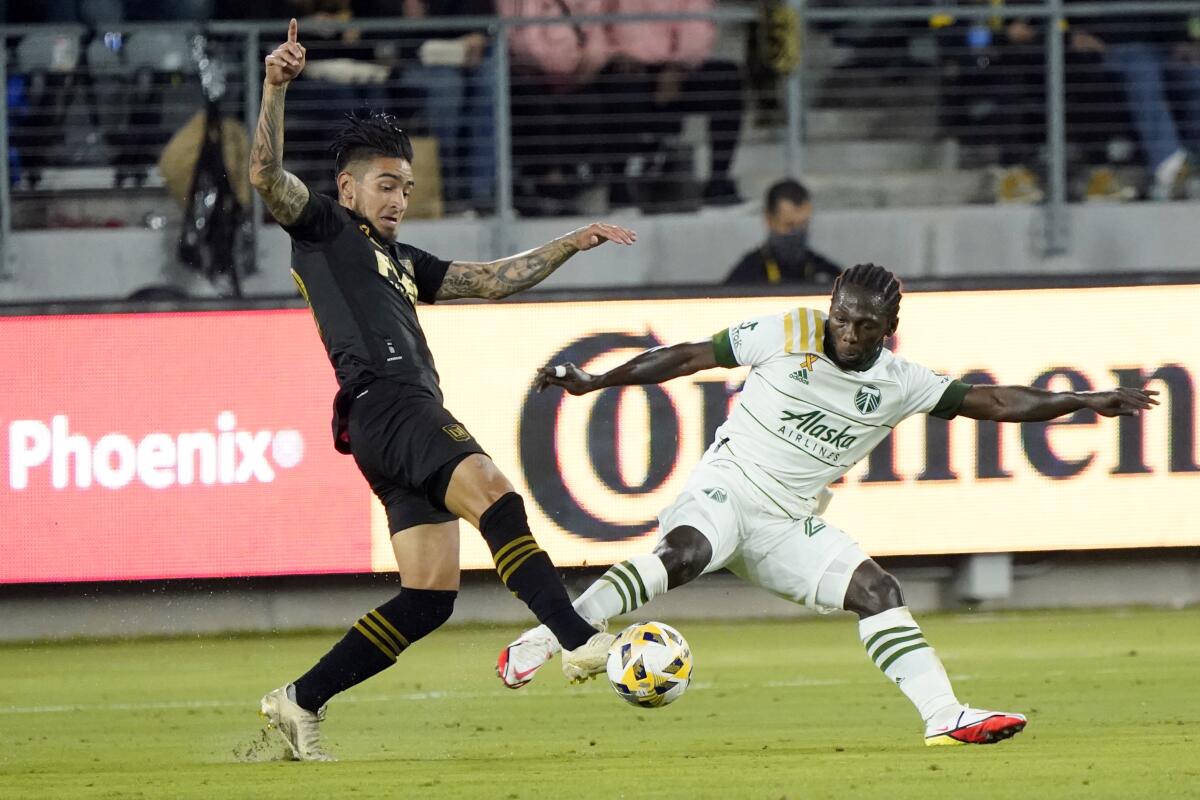
But in many ways Arango has become the team. In LAFC’s current three-game unbeaten streak, he has scored or assisted on all seven of the team’s goals. He’ll need to keep that up since LAFC remains two places and three points out of a playoff berth with three games to play, all against teams ahead of it in table.
After Tuesday’s match with Seattle, LAFC will host Vancouver — the team that currently holds the seventh and final playoff berth — next week before finishing the season at Colorado. LAFC, in its fourth MLS season, never has missed the postseason.
Arango doesn’t think they will miss it this fall, either.
“That’s the mentality,” he said in Spanish. “That’s what we’re always working for. God will control our destiny, but that’s what we work for.”
Experience pays off for Galaxy
The Galaxy are better positioned for their final push at a playoff berth. They enter the final two weeks of the regular season fifth in the Western Conference table and are tied with fourth-place Portland with 46 points. The top seven teams in the 13-team conference will advance to the postseason.
Even one loss in those final three games could eliminate the team from the playoffs for the fourth time in five seasons after last Saturday’s 2-2 home draw with Dallas. The goals, both in the second half, came from Chicharito and Sebastian Lletget and capped a rally that erased a 2-0 halftime deficit and kept the Galaxy unbeaten in their last four games.
But the team now plays at Kansas City and Seattle, who are 1-2 in the standings, before finishing at home with Minnesota United.
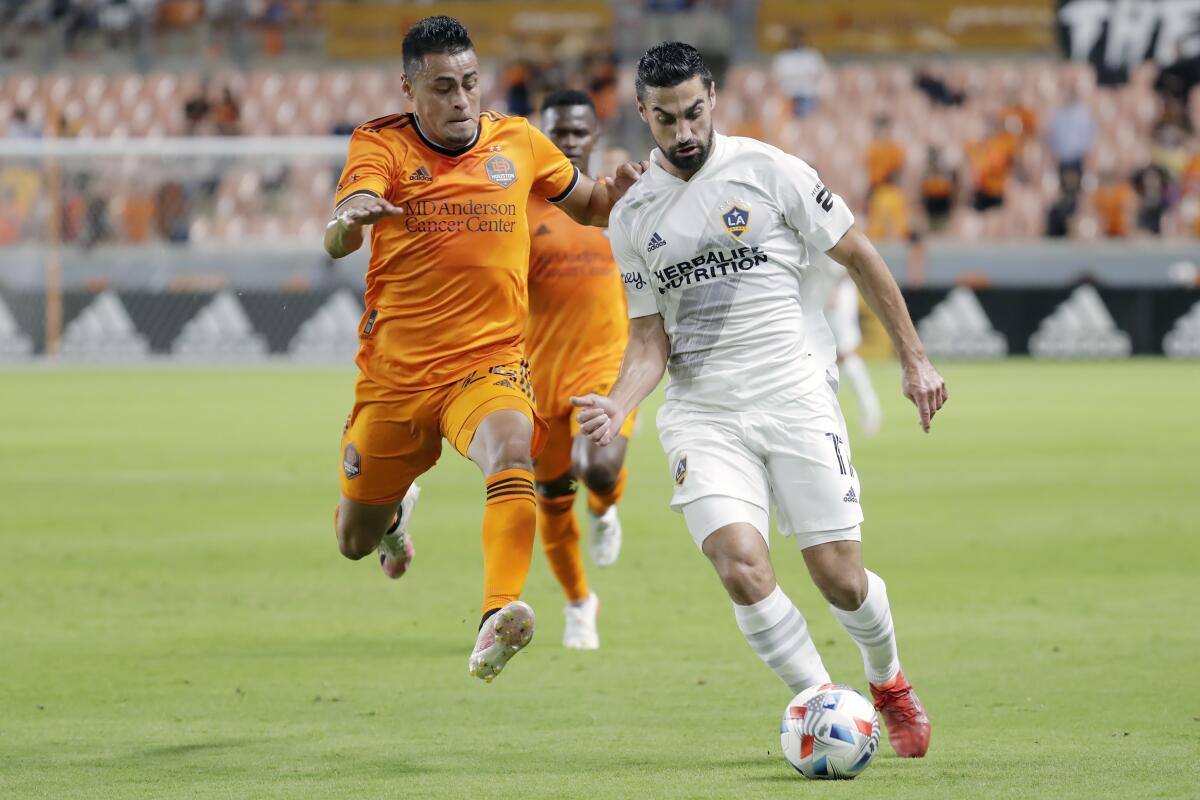
“Historically, very tough places to play,” said Lletget, whose game-tying goal in the 83rd minute was his first in MLS since mid-May. “They are two really good teams. There is a reason why they are at the top.
“We are more than good enough to beat them [but] I don’t think it is about ability at this point. We are at the point in the season where it is who wants it more. We are in a playoff spot, but we want to secure it.”
Trying to do that will be a new experience for most players on the roster; six of the team’s top 20 players in terms of minutes played have not appeared in an MLS playoff game. And that makes veteran Sacha Kljestan, who has played in 17 postseason games in seven trips to the playoffs, a valuable guy to have around the locker room.
“When we step on the field, with the standings so tight, every play matters,” said Kljestan, 36, who has played in 307 games is in his 12 MLS seasons. “Every point matters, every goal matters right now in goal difference and things like that.”
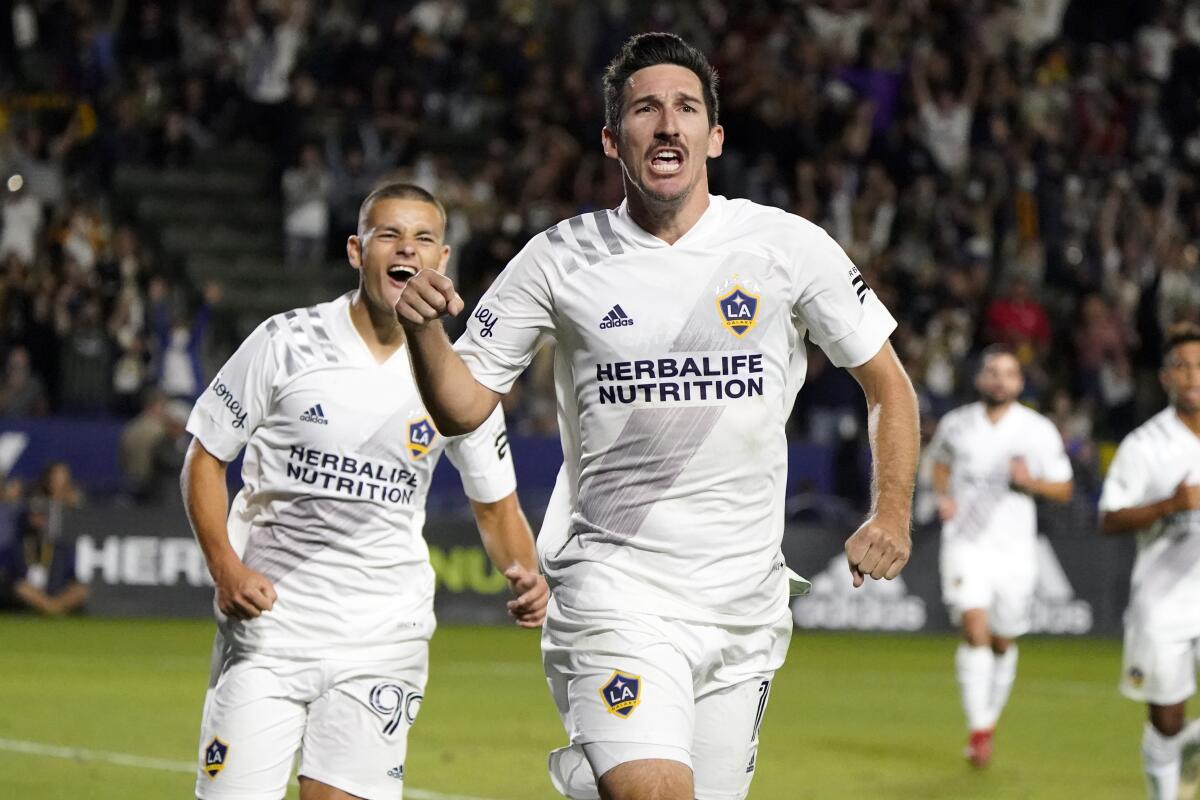
Kljestan’s experience may prove to be priceless in the Galaxy’s playoff chase, but management is paying just $247,350 for it. For that, it also got four assists and five goals from Kljestan — two of them game-winners — and a team-high 15 appearances off the bench.
Two years ago, Kljestan was making more than $1 million. Money, however, isn’t the issue now. The playoffs are.
“I just feel that when I’m on the field I’m able to still make a difference,” he said. “Now is the time of the season where the coach has to find guys that he can really depend on, and I think he can depend on me.
“An important and realistic goal for us now is top four in the Western Conference, just to make sure our first playoff game is at home, where I think we’re a much better team and much harder to play against.”
And finally there’s this …
Marla Messing, president and CEO of the 1999 Women’s World Cup organizing committee, was appointed to save the NWSL after Lisa Baird stepped down as commissioner earlier in the month in the wake of multiple charges of abuse and sexual coercion around the league. Messing’s appointment as the league’s CEO is said to be an interim one, which is good news. For all of Messing’s work as an attorney and successful sports executive, to truly recover from the recent scandals the NWSL needs a leader like Mia Hamm, Julie Foudy or Jill Ellis who has been in the locker room and understands the issues facing players.
Podcast
Don’t miss my weekly podcast on the Corner of the Galaxy site as co-host Josh Guesman and I discuss the Galaxy each Monday. You can listen to the most recent podcast here.
Quotebook
“It’s also a tribute to our fan base. You lose that perspective sometimes. There still aren’t that many teams in the world that draw 40,000 fans a game. And when we’re able to do that, that’s really fun to play in front of. If you’ve got that stability from a management perspective, you have the support of the fan base, the team is relevant — people in Seattle know who the Sounders are — the guys just feel appreciated. Happy workers, happy players, they tend to perform better. And so to me it becomes almost this virtuous ecosystem where we have a lot of things going in our favor.”
Garth Lagerwey, general manager of the Seattle Sounders, on some of the reasons for his team’s continued success
Until next time...
Stay tuned for future newsletters. Subscribe here, and I’ll come right to your inbox. Something else you’d like to see? Email me. Or follow me on Twitter: @kbaxter11.




